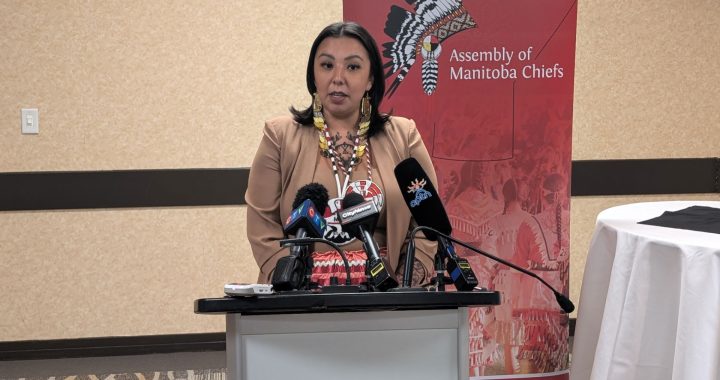Trina Roache
APTN National News
HALIFAX – Chiefs in the Maritimes are ready to take the federal government to the Supreme Court of Canada over a plan by Aboriginal Affairs (AANDC) to cut social assistance rates on-reserve to provincial levels.
The legal battle has gone on for three years. While the Mi’kmaq won the first round at the Federal Court of Canada, Ottawa appealed and won. It will be months before the chiefs know if Canada’s top court will hear the case.
Maliseet and Mi’kmaq chiefs say the problem with the federal plan is bands use the social assistance money differently.
“This case is about how the government interprets comparability,” said Naiomi Metallic, the lawyer representing the chiefs. “More broadly, it’s about what limits are there on AANDC when it makes decisions like this? Does it have to consult First Nations?”
Metallic said Ottawa doesn’t take into account that certain programs off reserve, aren’t available to Mi’kmaq living on social assistance in First Nation communities.
“Equality standards that exist today are such that, it’s not just providing identical services,” said Metallic. “It recognizes that sometimes treating people equally might mean treating them different but to their benefit to make sure that really overall they get the same.”
With a two per cent cap in place since 1996, First Nations’ social programs are already underfunded. To pay for housing, the band shaves off a portion of the social assistance money to pay off the loan to Canadian Mortgage and Housing Corporation.
That won’t happen under the new formula.
“Ottawa would save millions of dollars,” said Metallic. “But at what cost?”
In Mi’kmaw communities, a single person on welfare right now gets a cheque for $82 a week and in some communities, like Elsipogtog in New Brunswick, 85 per cent of the band is on welfare.
“Mi’kmaq community members who are on social assistance are surviving on very little money,” said Chief Leroy Denny, lead chief of the social portfolio for the Assembly of Nova Scotia Mi’kmaq Chiefs. “How can there be equality when non-Native social recipients have access to government programs to help them when our people do not?”
Metallic said it’s a complete 180 from social policy Aboriginal Affairs followed until 2011. In fact, AANDC spent a decade and $15-million dollars working with Mi’kmaq and Maliseet leaders to develop an income assistance manual.
It was delivered to Aboriginal Affairs in 2007 where it sat on a bureaucrat’s desk gathering dust. That manual was never implemented.
Instead, four years later, regional officials were told by AANDC Headquarters in Ottawa to save money. There was a push toward what government called active measures, programs to offer people re-training, literacy classes and get them back to work, but no new money to do it.
“In 2011, we were already not equal and the government wanted to make it worse,” said Metallic. “But you can’t take the money out of basic social assistance to do that because people just need a basic level in order to survive so by further impoverishing them on the day to day amounts, that’s not going to encourage people to go do the things to get them jobs. They’re going to be fighting to basically just exist.”
Denny said the government’s current position would “starve” people in the communities.
“We are constantly looking at ways to create opportunities and employment for our community members. These changes will not help our people but rather put them further back. Starving our people will not create a better life.” said Denny.
Court documents show that officials with Aboriginal Affairs knew that there would be negative impacts. The evidence list includes “damage to AANDC/First Nation relationships,” “negative media attention,” and “increased demand” on child and family services.
“More child apprehensions,” said Metallic. “Department officials absolutely knew that the decisions they were going to make was going to have severe consequences on people.”
The legal battle has gone on for three years. While the Mi’kmaq won the first round at the Federal Court of Canada, Ottawa appealed and won.
It will be months before the chiefs know if the Supreme Court of Canada will hear the case.
But Metallic says there are important questions that impact all First Nations across the country.
“We’re saying to the Supreme Court, you’ve heard a lot of cases about aboriginal and treaty rights and that’s all very important, but services on reserve are just as important,” said Metallic. “The system that’s currently working is broken. Even the UN Special Rapporteur recognized that things are worse than they’ve ever been on reserve in terms of services that people are getting.”
At the same time Aboriginal Affairs was trying to implement this new funding scheme for social assistance in 2011, Canada’s Auditor General reviewed programs for First Nations on reserve and found a “lack of appropriate funding mechanisms,” a “lack of clarity about service levels,” and a “lack of a legislative base.”
That gives Aboriginal Affairs a lot of leeway to make unilateral decisions.
“It creates this kind area where AANDC can go in and make decisions and there’s no oversight by parliament and other bodies,” said Metallic. “Right now, there’s barely any boundaries provided by law. So that’s what we’re asking the court to do.”
@trinaroache











